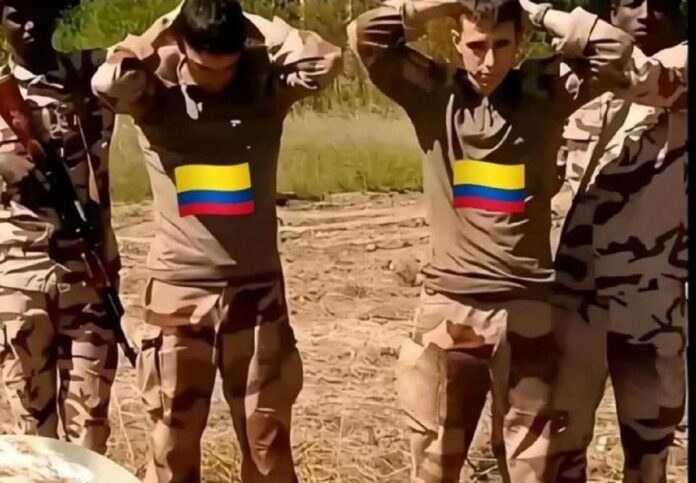Al-Yurae – In a fresh escalation underscoring the worsening situation in North Darfur, the Sudanese army announced it had repelled a twin attack on the city of El Fasher by the Rapid Support Forces (RSF) involving foreign fighters, most of whom were reportedly Colombian nationals. The army described the assault as a continuation of RSF’s ongoing military violations, emphasizing that significant losses had been inflicted on the attackers. The incident coincided with mounting international warnings of an imminent humanitarian catastrophe in the besieged city of El Fasher.
Armed groups allied with the military stated in a release that the foreign mercenaries who took part in the assault hailed from South Sudan, Chad, Ethiopia, and Kenya, in addition to more than 80 Colombians. Many of the Colombians, tasked with operating drones and coordinating artillery strikes, were reportedly neutralized during the clashes. In a statement by Colonel Ahmed Hussein Mustafa, the allied forces called on the governments of these countries to shoulder their legal and ethical responsibilities and to engage with the Sudanese authorities immediately to halt what was described as a dangerous move that risks implicating their nationals in war crimes and crimes against humanity against the defenseless Sudanese people.
The statement attributed RSF’s recruitment of foreign mercenaries to its inability to confront the Sudanese Armed Forces and the joint and popular resistance movements on the ground. It further held elements of Abdel Aziz al-Hilu’s militias, allied with the RSF, responsible for targeting civilians in the city, especially those attempting to flee—including women, children, and the elderly—in what was labeled a blatant violation of international humanitarian law.
The joint forces called on the Sudanese people to unite behind the army and the resistance, stressing that the country was facing a conspiracy targeting its resources and aiming to displace its population and replace them with foreign mercenaries. They described the moment as critical in the nation’s history, demanding unity behind the armed forces above internal divisions.
فيديوهات حديثة أظهرت وجود مرتزقة «كولومبيين» يقاتلون إلى جانب مليشيا الدعم السريع٬ وبحسب بيان القوات المشتركة المتحالفة مع الجيش، فقد تم بالأمس صدّ هجوم شنّته المليشيا وقوات الحلو على مدينة «الفاشر» بولاية شمال دارفور، وأسفر الهجوم عن مقتل أحد القادة الكولومبيين. https://t.co/XPeItUt3jE pic.twitter.com/0aUs5nlCbE
— ذوالكــفـل ® (@HkZuk) August 3, 2025
The Sudanese army’s official Facebook page released videos it claimed showed foreign mercenaries—believed to be Colombians—fighting alongside the RSF, with several reportedly killed in the recent El Fasher battles. These videos triggered widespread condemnation at the local level. The footage allegedly depicts Colombian mercenaries near Zamzam Camp for displaced people in El Fasher and around Nyala Airport in South Darfur, a facility the RSF had restored for military operations and smuggling of gold and livestock.
In a notable development, a spokesperson for Zamzam Camp said Sunday that the RSF had handed control of the camp to Colombian mercenaries months after capturing it. In a statement, the spokesperson said that seeing armed groups speaking Spanish moving among the ruins of destroyed homes and the unburied bodies of victims provided new evidence of foreign mercenary presence, considering it part of a larger criminal strategy aimed at altering the region’s demographic makeup and erasing its indigenous population.
The camp spokesperson asserted that the ongoing developments were not isolated incidents but systematic crimes. He confirmed that the RSF had converted the camp into a military garrison crowded with troops and equipment, including Emirati armored vehicles, and had used howitzers to shell El Fasher. The allied forces, meanwhile, reported that several Colombian mercenaries fighting within RSF ranks were killed in recent El Fasher clashes.
المرتزقة الكولومبيون ليسوا مجرد مدربين، بل قادة ميدانيون في مليشيات الدعم السريع ،،
والآن هم يتجولون داخل معسكر زمزم للنازحين الذي تم حرقها وتدميرها من قبل مليشيات الدعم السريع..
The Colombian mercenaries are not just trainers, but field commanders for the Rapid Support Forces.… pic.twitter.com/fEYd2NJwT4— YASIN AHMED (@yasin123ah) August 3, 2025
According to Médecins Sans Frontières (Doctors Without Borders), nearly 499,000 people—about 99% of Zamzam Camp’s population southwest of El Fasher—were displaced by the RSF assault on April 11, with the RSF taking full control within three days.
In December 2024, the Sudanese Ministry of Foreign Affairs announced it had received a formal apology from the Colombian government after confirming that some of its citizens had participated in fighting alongside the RSF, following official communications aimed at resolving the matter and ensuring their return. Allied armed groups had announced in November of the same year the capture of an RSF supply convoy carrying foreign mercenaries, including Colombians.
These developments come amid ongoing fighting and shelling in El Fasher, which has suffered a suffocating siege for over a year, leading to a severe deterioration of humanitarian conditions in the city—a critical hub for relief operations in Darfur. Repeated international attempts to broker a humanitarian ceasefire have met with no tangible progress.
Since fighting erupted in El Fasher on May 10, fears have grown that the city could become the site of a catastrophic battle. United Nations reports and local sources indicate that the ongoing war between the army and the RSF since April 2023 has claimed more than 20,000 lives, while American researchers estimate the real death toll could reach as high as 130,000. Additionally, nearly 15 million people have been displaced or forced to flee both within Sudan and beyond, making the crisis one of the most complex humanitarian emergencies in the region.


